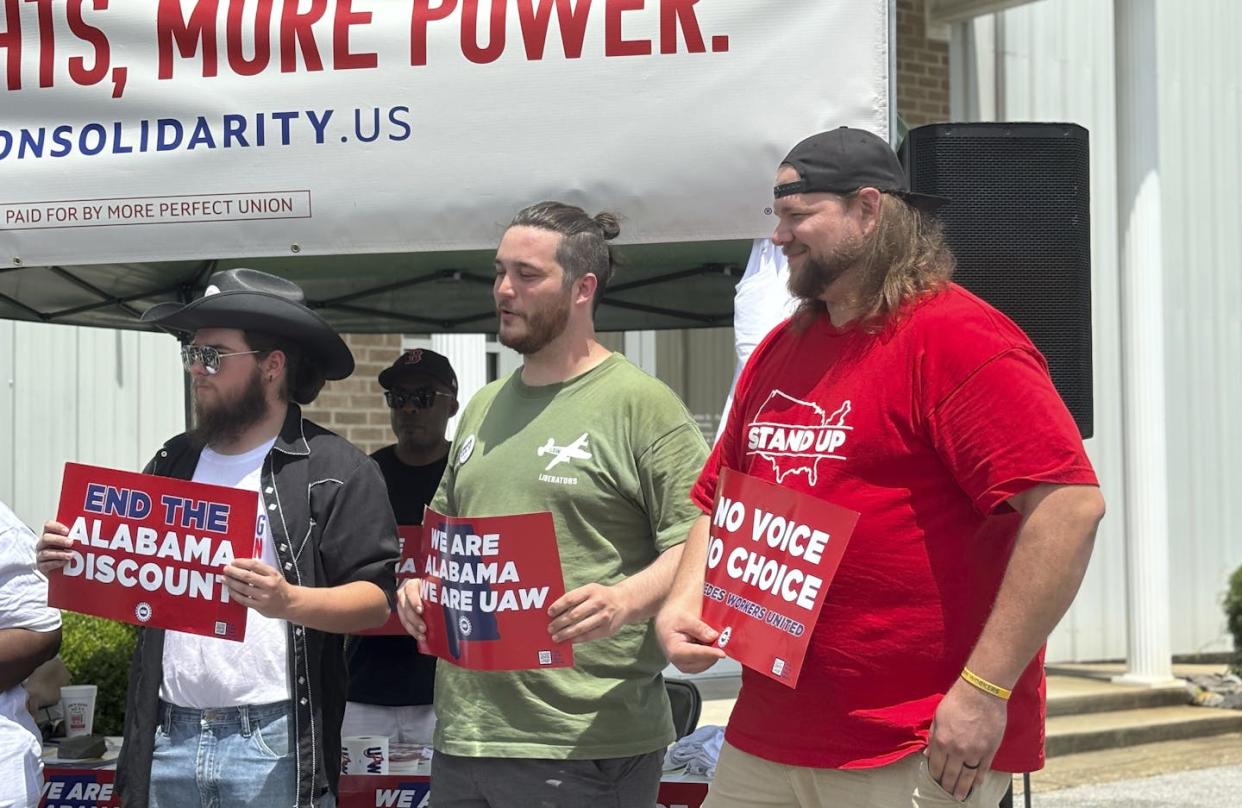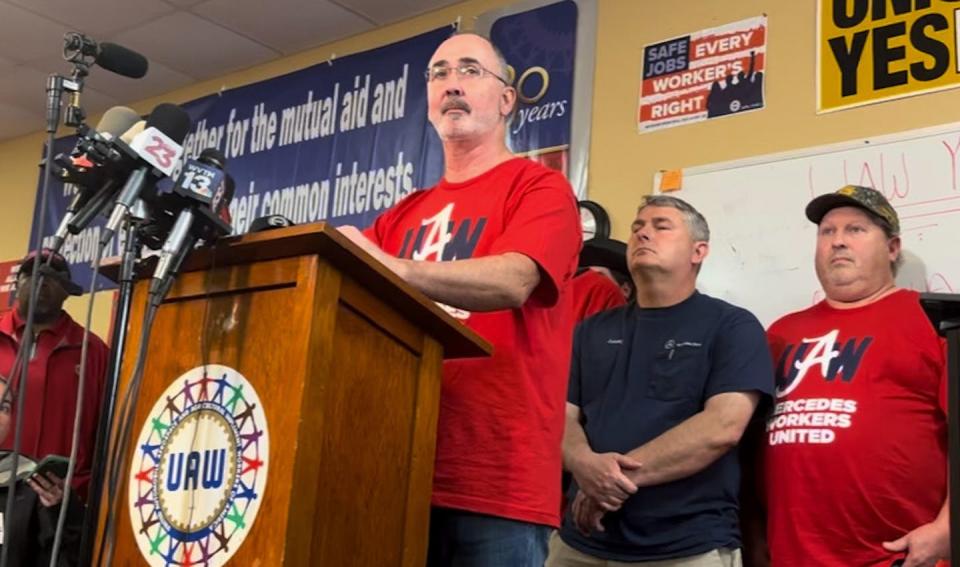United Auto Workers’ defeat at Mercedes’ Alabama plants underscores challenges for organized labor in Southern states

A majority of the workers at two Mercedes plants near Tuscaloosa, Alabama, rejected an opportunity to join the United Auto Workers union in an election that concluded on May 17, 2024.
UAW supporters lost 2,642 to 2,045, just one month after the workers at a Volkswagen plant in the neighboring state of Tennessee chose by a 3-to-1 margin to join the union.
Based on my research about organized labor in the United States and other countries and what I learned when I went to Alabama to observe the election and talk to Mercedes workers, I believe what happened in Alabama illustrates how hard labor organizing is in the South, but it’s too soon to write off the UAW’s chances in the region.
Public and private efforts to block unions
The UAW made eight failed attempts to unionize foreign-owned auto plants in the South over the past 35 years. That losing streak ended when it won 73% of all ballots cast in its historic Tennessee win.
My most recent book, “The UAW’s Southern Gamble: Organizing Workers at Foreign-owned Vehicle Plants,” highlights the big challenges the UAW has long faced in the South.
For 40 years, Southern political and business leaders have sought to attract investment to their states – especially from foreign-owned manufacturers – by offering massive subsidies, low taxes, lower labor costs and a largely compliant workforce.
This model has worked. Today, roughly 30% of U.S. autoworkers are in the South, up from about 15% in 1990.
Whenever the UAW has tried to unionize the industry in the region, the Southern political establishment, which the Republican Party dominates, has pushed back.
Most recently, six Southern GOP governors encapsulated that tradition in a joint letter shortly before the Volkswagen vote. In it, they denounced the UAW’s organizing drive as “special interests looking to come into our state and threaten our jobs and the values we live by.”
‘Union avoidance playbook’
Automotive executives across the American South have developed what I call a “union avoidance playbook.”
This strategy includes locating plants in rural areas with little union membership, screening out hires who might be sympathetic to unions, and dividing the workforce by using temp agencies to fill a significant share of positions.
Messaging is equally important.
The plants have television monitors in break rooms and cafeterias that run pro-company and anti-union messaging. To undercut support for unions, companies donate lavishly to local churches, charities and politicians.
If, despite these efforts, a labor campaign gains momentum, plant managers typically launch a communication blitz that includes mandatory meetings for whole shifts and smaller meetings with undecided employees to make the case against unionization. Union supporters don’t get an opportunity to respond.
In recent years, the communication strategy has included a torrent of anti-union emails and text messages to persuade employees to oppose unionization.
Most foreign-owned Southern automakers will hire anti-union consultants with years of experience fighting unions to guide their efforts. If the election still looks close, the companies may replace the plant’s local CEO.
That new hire then tells employees that the company now understands their grievances and asks for a second chance.
Why UAW won over Volkswagen workers
The UAW’s Tennessee win suggests that the Southern public-private, anti-union partnership is not invincible. Three factors explain the union’s success.
First, the election of Shawn Fain as UAW president in March 2023 marked a turning point. The charismatic electrician from Kokomo, Indiana, wasted no time shifting the UAW away from its prior accommodation with automakers.
Fain used forceful rhetoric and innovative tactics to score wins at the bargaining table throughout the UAW’s concurrent strikes at Ford, General Motors and Stellantis in the fall of 2023.
The new contracts that followed gave workers substantial pay and benefits increases and restored cost-of-living adjustments. Those deals also eliminated a two-tier wage structure that paid workers hired since 2007 significantly less for doing the same job than colleagues with more seniority.
By late 2023, the UAW had shown Southern autoworkers that it could deliver gains that their employers were unlikely to grant on their own. This made more Southern autoworkers want to join the union.
Second, the UAW revamped its labor organizing system.
Out went its top-down approach. Under Fain’s leadership, the UAW hired Brian Shepherd – a proven organizer from the Service Employees International Union – to take charge.
Shepherd has empowered automotive employees who were supportive of unionization to tailor the organizing campaigns to what they thought would work best.

German solidarity
Third, the UAW’s relationship with Volkswagen’s German works council leadership, which represents employees in the workplace, has dramatically improved.
A works council is an elected body of employees that represents employee interests at the workplace and company levels. It is distinct from the German metalworkers union, IG Metall, which has always been supportive of unions representing U.S. autoworkers.
Ties between the UAW and the works council were strained during the 2014 and 2019 organizing campaigns. But the works council leadership changed in 2021.
During the Volkswagen campaign, the German works council intervened in several instances to soften management’s resistance to unionization and to urge Chattanooga employees to vote for the union.
The UAW’s Mercedes defeat
In previous votes at foreign-owned auto plants in the South, the UAW typically garnered just one-third of the vote. In Alabama, it received 44%. So, it’s reasonable to see that loss as a sign of progress and strength, even if it fell short of a majority.
As I explain in my book, to win an election, a union must prevail in the political arena and within the company as a whole, as well as the workplace.
Mercedes had the overwhelming support of Alabama’s political establishment, including Rev. Matthew Wilson, a Tuscaloosa City Council member and Baptist church pastor.
There was a big difference between what happened with the labor campaigns at Mercedes and Volkswagen, however. The UAW gained timely support of the VW works council, which persuaded the company’s management not to hire anti-union consultants, use anti-union language or hold mandatory meetings.
In contrast, the Mercedes works council protested only belatedly, failing to change Mercedes’ approach. In addition, Mercedes replaced the local CEO, Michael Göbel, with Federico Kochlowski, who promised that the company would do a better job addressing the employees’ long-standing concerns.
This closing barrage revealed a weakness in the UAW’s employee-led organizing model. It proved difficult for the small number of organizers to respond quickly and effectively using a network of employees who had little experience with these tactics.
Despite the victory in Alabama, Mercedes management may be in trouble in Germany for reportedly resorting to unfair tactics.
The German government is investigating whether the company’s anti-union campaign violated the country’s supply chain law, which requires companies to respect economic, governance and social standards, including labor rights, at their foreign facilities.
Violators can be subject to a fine of up to 2% of total sales.
Separately, the UAW has filed a complaint against Mercedes with the National Labor Relations Board, alleging anti-union tactics. The complaint is pending with that federal agency, which is responsible for enforcing the right of U.S. workers to organize.
Moving foward
Fain vowed to continue the organizing drive when he announced the results at Mercedes. “These workers will win their fair share,” he said. “And we will be there every step of the way to support them.”
I would not be surprised to see a majority of workers ultimately decide to support joining the UAW at the two Mercedes plants in Alabama.
The vote was relatively close. Unionization drives often fall short in the first attempt but succeed subsequently when it becomes apparent that management is not going to fulfill promises to do better.
If the UAW leadership can persuade the Mercedes works council to pressure management to curtail use of the union avoidance playbook, prospects for organizing the Alabama plant with a new campaign look especially promising.
In my view, the UAW also has a reasonable shot at organizing BMW workers in South Carolina.
On the other hand, unionizing Southern workers employed by Korean and Japanese-owned automakers is likely to prove more challenging – partly because neither country has an institution similar to Germany’s works councils.
For the UAW to succeed throughout the South, I believe that it will have to develop strategies that can overcome the entire repertoire of the region’s union-avoidance playbook.
Portions of this article appeared in another article published May 7, 2024.
Stephen J. Silvia received funding for this research from the American Political Science Association to conduct research at the UAW archives, which are housed at Wayne State University's Walter Reuther Library, and from the Hans Boeckler Foundation to conduct research at southern automobile plants.

